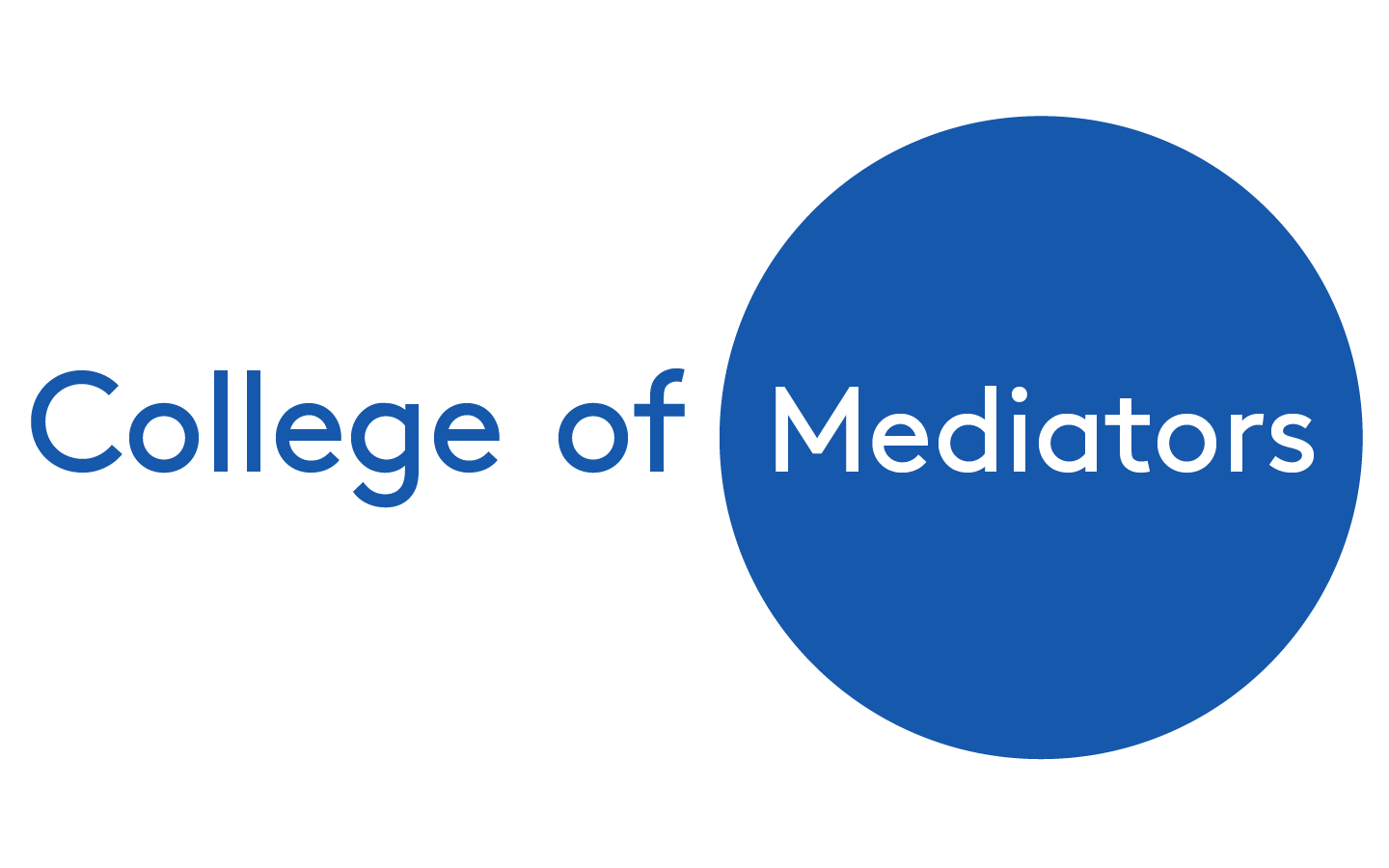Response to Ministry of Justice consultation: Supporting earlier resolution of private family law arrangements
Response to Ministry of Justice consultation: Supporting earlier resolution of private family law arrangements

Response to Ministry of Justice consultation: Supporting earlier resolution of private family law arrangements
June 2023
The College of Mediators and its members support earlier resolution of parental and family conflict. For this reason, we welcome the effort to increase the early use of mediation and other non-court dispute resolution options outlined in the consultation document and we are keen to co-operate with any constructive proposals in this regard. We are also very pleased to see a coherent outline in the consultation of the damage that conflict does to children and families.
However, we do have concerns related to this consultation, as outlined below.
Questions 1 & 2
We welcome early attendance at co-parenting programmes. However, in some situations, a requirement for attendance prior to mediation could result in delaying dispute resolution and do more harm than good. We support the improvement and streamlining of information for parents/carers as well as more integration between family hubs, family courts and mediation providers.
Regarding mediators assessing suitability and referring to co-parenting programmes, concerns were raised that subjective analysis on the part of the mediator does not sit well with our impartial role. There was concern also about administration and training for all mediators before these referrals could happen.
There was some ambiguity regarding whether co-parents would be required to attend co-parenting programmes together or separately. If joint attendance is required, this would raise concerns and would necessitate further discussion.
Question 3
We recognise the importance of good communications to inform and enable disputants to engage in earlier conflict resolution. For this reason, online resources such as short information videos would be welcome. Information on the court process could usefully be provided at the MIAM and the co-parenting programme. Links to online resources and information could be integrated into divorce application forms.
Question 4
In our view, the online tool could play an essential part in encouraging uptake of mediation and other non-court dispute resolution options. Neutral and coherent information about options available and a sign-posting service would do far more to foster a culture of earlier and sustainable dispute resolution than compelling disputants to attend mediation.
Questions 5 & 6
Consultation on the question of mandatory mediation with our members highlighted much concern amongst practising family mediators, both about the issue itself as well as the lack of focus in the consultation process on whether mandatory mediation is actually appropriate. Here is a selection of views expressed:
- Compulsory mediation would be completely anathema and inappropriate.
- It goes against several of the core values and principles of mediation – voluntary participation, impartiality and confidentiality.
- Forcing people to participate would lead to client resentment and damage the public perception of mediation, ultimately undermining and destroying a process that is working well to provide early resolution of conflict.
- Making mediation compulsory would lead to new power imbalances.
- It would be unworkable, legally and administratively.
- What makes mediation successful should be protected and valued, not eroded.
The examples of mandatory mediation in Norway, New Zealand and Australia, given in the consultation document, are problematic. The Norway model was found to be a failure, especially in high conflict cases. In New Zealand, unwillingness to participate on the part of one or both parties precludes mediation from taking place. Although little reliable research exists about the Australia model, it is concerning to note the pressure on parties to reach a resolution through mandatory mediation.
Our members report a recent increase in cases referred from court to mediation mid-proceedings. Some mediators’ experience of this has been that it undermines the mediation process as one or both parties feel negatively about being compelled to mediate.
Section 14 of the Family Law Act 1996 sets out the factors to consider when determining whether to adjourn and specifically mentions the need to protect children’s interests. It is concerning that this consultation document does not also mention children’s interests in this regard.
There is concern that the mediation profession is being asked to resolve a problem that exists within the legal system. If the exemption rules were addressed and both parties were required to attend MIAMs, it would stop many inappropriate court applications being made.
Adding pressure to people already stressed or traumatised by their conflict experiences is an unnecessary cruelty when there are more effective ways of resolving the current difficulties with inappropriate applications and court delays.
Mediators still report clients being referred by their solicitor, following multiple meetings, for a MIAM as a tick-box exercise prior to a court application. These clients are often willing to mediate and mediation can still be explored as a viable option at that stage but, if they are referred to mediation earlier, the chance of success is greater.
Our members consider that refining existing systems and rules would yield more positive results than fundamentally altering the basis of mediation, which is functioning well. For example, could mediation be automatically offered on an opt-out basis, as in the pilot telephone mediation scheme run by the Small Claims Mediation Service, rather than forcing unwilling people to attend? One finding from this pilot was that increasing understanding of mediation would help users to engage more effectively. This subtle shift in requirement would still allow for voluntary attendance, which is core to the practice of mediation.
It should be noted that, according to a MOJ-supported Nuffield Family Observatory research project published in November 2022, the vast majority of separating parents do not use the court (12%-15% going to a contested hearing for financial settlement and 9%-10% for child arrangement orders). These findings show that parents and families do not see court as their first port of call.
Questions around penalties to be imposed if people refused to attend compulsory mediation were raised by our members. There is considerable concern about risks to individual mediators and services as well as to the profession generally. What would the public perception of mediation become once stories began to circulate of being forced to attend sessions or else face harsh penalties? Much effort has been invested in the marketing of mediation in recent times, by the government and the industry. Mediators report that disputants are more likely, in the last decade especially, to see mediation as a first and best option. Our members believe that continuing this good work on culture change will yield more positive long-term results than mandating mediation.
The issue of procedural fairness was raised in discussion with our members. There is no mention in the consultation document of procedures for complaints or appeals.
The California model has good systems in place for complaints and appeals and shows how essential this would be. It’s concerning that it has not been addressed so far.
Question 7
Our members are mostly keen for MIAMs to be compulsory for both parties, seeing the opportunities for clients to consider mediation earlier. Issues around funding and resentment amongst clients would need to be addressed. Clients are likely to feel resentment at having to attend when mediation is unambiguously unsuitable, for example.
Question 8
Mediators can certify only whether mediation has taken place. To claim one or both parties have made a reasonable attempt to mediate or not would constitute a breach of the Family Mediation Council’s Code of Practice.
Asking a mediator to outline their subjective view of what took place in a mediation session presents significant, unfair risks to individual practitioners and to the profession as a whole, especially where punitive implications and cost sanctions can apply. In Australia, this was found to be unworkable, unsurprisingly.
In civil cases, what constitutes a reasonable attempt to mediate has been more clearly defined for the courts. This may be usefully applied in family cases too.
Question 12
Legal Aid rates for mediation have remained static since 2004. Therefore, more detail is needed on ‘full funding’. There is a range of different views amongst our members regarding the voucher scheme. Most mediators have found the voucher scheme to be of significant benefit to clients in accessing mediation. Many respondents told of clients who attended mediation (and reached a resolution) through the voucher scheme who would not otherwise have been able to afford it. Mediators providing legally aided mediation specifically cited the benefit of offering a more equally funded service to both parties, if one is eligible for legal aid and the other is not. Many of our members would like to see the voucher scheme extended to finance cases and to have an amount larger than £500 available for complex cases.
None of the feedback from our members supported compulsory mediation even if it were fully funded.
There is concern amongst our members that the voucher or another central funding scheme could ultimately lead to phasing out legal aid, making mediation inaccessible to those who cannot afford to pay for a MIAM and costs beyond £500.
Mediation is an independent, standalone service and must not be seen as part of the legal process. Mediators are keen not to be mistaken for civil servants. If funding of mediation came from one central source, some mediators feel that it could weaken the profession. There is a great diversity of mediation providers, which is part of the profession’s strength and to be valued. Our members worry about smaller providers being squeezed out from practice by some of the proposals outlined in the consultation document.
Finally, although there is significant concern around some of the proposals in the consultation document, we appreciate having an opportunity to air our views and we feel confident that a satisfactory way forward will be found. We look forward to further dialogue on these issues.
College of Mediators Board of Directors
